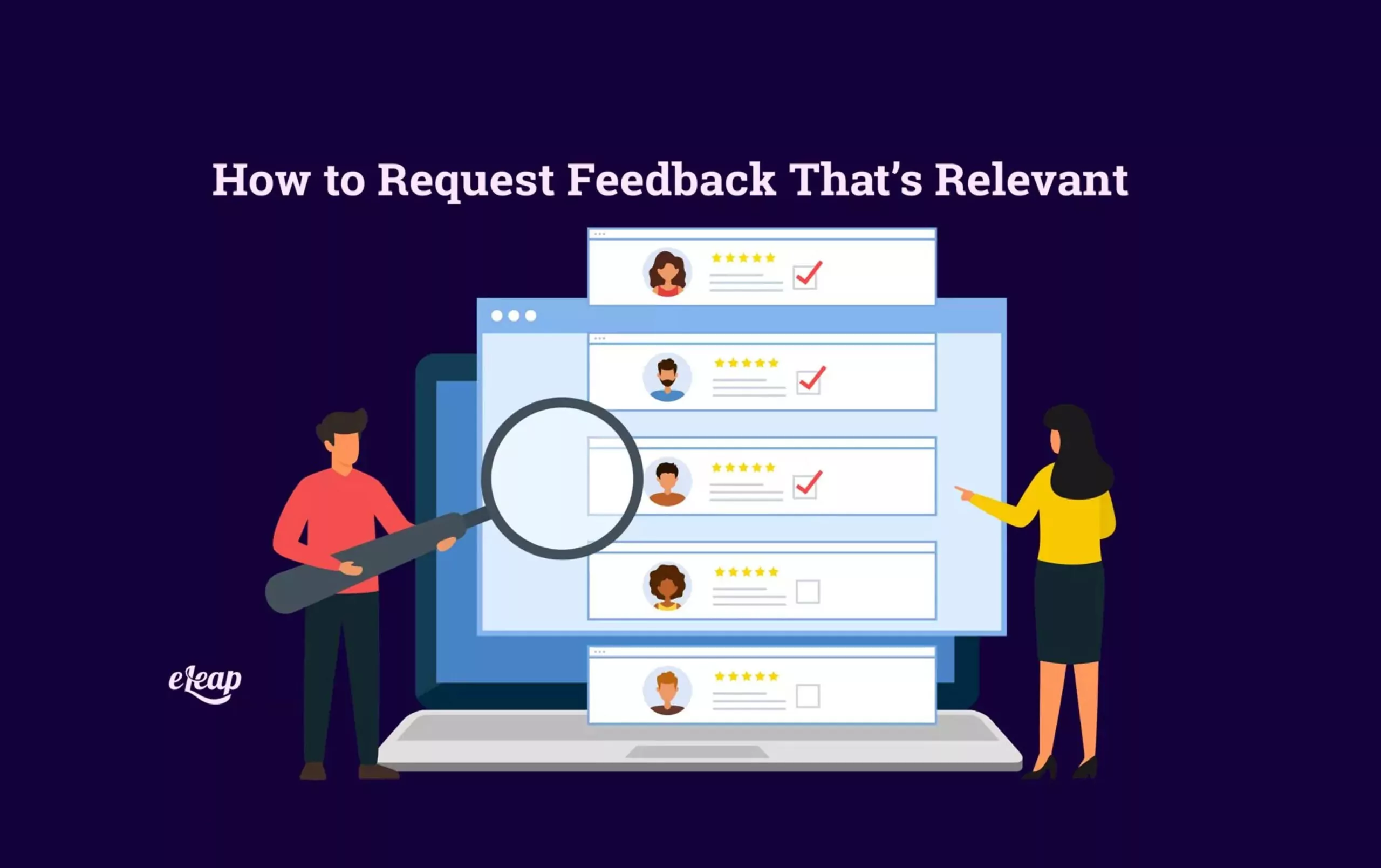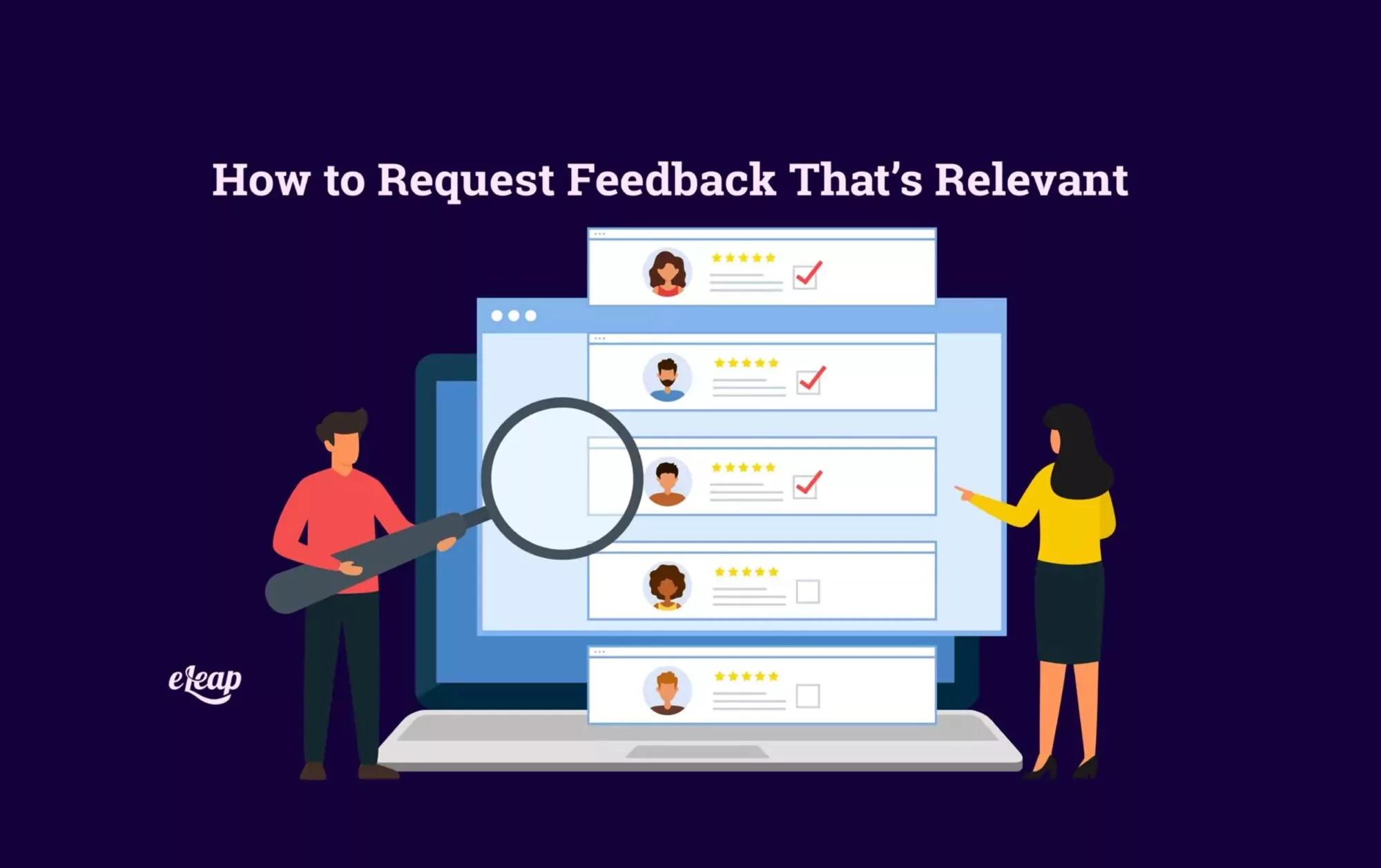How to Request Feedback That’s Relevant

Do you want to request feedback at work, but do you want it to be worth your time? Too many employees feel like they receive feedback that isn’t relevant or helpful to their work goals. This can be a frustrating experience. However, if you can request feedback, you can make sure you’re getting the type of feedback you want. Explore how eLeaP®’s Performance Management Platform can simplify evaluations, boost productivity, and drive measurable results.
Why it’s Beneficial to Request Feedback
We’re all aware that feedback is a successful tool in the workplace. Feedback offers employees the tools and information they need to better succeed in their current positions and reach their goals. However, feedback can only reach its full potential when it’s relevant and desired.
Requesting feedback helps employees build their confidence in the workplace. When an employee takes the initiative to ask for specific feedback, it shows that they’re taking the initiative to ensure they’re doing a great job at their delegated tasks.
Not only that but when an employee requests feedback, they have more control over the conversation being had. This means that they can steer their conversations to specific topics that they want to discuss instead of waiting to see what kind of feedback their manager may give them. Having control over the conversation makes feedback more relevant to the person receiving it. When you receive relevant feedback, you’re more likely to use it in your daily tasks.

In short, asking for feedback proactively comes with many benefits:
- Demonstrating maturity and ownership of your position
- Helps create a culture where feedback is normal
- Helps you understand the impact your position has on the company
- Creates dialogue
- Increases problem solving
- Helps narrow your focus to what’s most important
- Can help you reach goals quicker
Tips for Requesting Quality Feedback – Before
When you want to request feedback from a coworker or manager, you need to adequately prepare for the session. Here are some tips on making sure you’re ready to receive feedback.
Be Clear on What You’re Looking for
It’s important that you have a goal in mind for your feedback session. If you’re only looking for a pat on the back of a confidence boost, it’s not the right time for a feedback session.
You should have a clear topic or project that you want feedback on to get the most out of the input you receive. When you have a focused topic, you’re more likely to receive productive feedback that you’ll put into action.
Know the Right Person to Ask
Not everyone on your team will make a great coach for feedback. Take time to determine whom you’re going to request feedback from. You can ask either a manager that you trust or a teammate who knows your position and duties well. It’s also a good idea to ask a few people with different leadership styles to get a well-rounded idea of your progress.
Have the Right Questions Ready
You’ll want to make sure you’re asking a good selection of questions to get the information you’re looking for. There are different types of questions that all have different purposes. Having a mix of the different types will help you get the highest-quality feedback.
Open-ended questions require detailed answers. They’ll allow you to get more information on a certain project or area that you want to receive feedback on. These questions are great for being clear on the context from where your feedback is coming from.
Yes or no questions are quickly answered. They’re best used if you’re looking to simply confirm an idea you already have or to get validation from something you’ve heard.
Follow-up questions are ones you may be able to prepare ahead of time, which you ask after receiving an answer to one of the other types of questions to get more information.
Tips for Requesting Quality Feedback – During
Of course, you can only receive feedback that’s as specific and relevant as your request was. To make sure you’re receiving the type of feedback you want, check out these tips before you send out your request.
Make Your Request Clear
When you’re asking for feedback, it’s crucial that you’re clear about wanting detailed and honest information. Remind the person you’re asking that you want helpful feedback, not simply nice comments about your work. You’ll get the best feedback if the person giving it is vulnerable and honest about how they feel about your work.
Look Forward, Not Back
Don’t focus on things that you messed up in the past. Instead, ask about what changes you can make moving forward to perform better. When you approach to feedback in this way, it’s easier for the person giving it to focus on actions instead of your personal traits. With less chance of making feedback too person-focused, you’re likely to get more honest feedback.
Ask Follow-up Questions
After you receive answers to your initial questions about your work performance, dig deeper for more information. This is a great opportunity to ask questions that are specific to certain projects or areas where you need some extra assistance. When you ask more specific questions, you’re more likely to get the detailed feedback you’re looking for.
Keep an Open Mind
It’s crucial that you don’t come into your feedback session with any preconceived opinions about what you’ll hear. This is important for both positive and negative pieces of feedback. Don’t get defensive when the person giving you feedback mentions areas where they feel you could improve. When you appear agitated by the feedback, you’re likely going to lose your chance at honest feedback.
Take Notes
It’s a good idea to jot down some notes while you receive feedback. This can help you remember what’s discussed after the meeting ends. It may also keep you from interrupting the other person while they give feedback. Both of these elements will help you get the most out of your feedback.
Tips for Using Quality Feedback
After you’ve received the feedback you’re looking for. Your work isn’t over. It’s time to put that feedback to use to perform better in your position. There are some great ways you can respond to and use the feedback you receive.
Reflect and Review
Take some time to go over the feedback you received and digest it. This is a great time to organize the feedback you receive based on topic, project, or whatever categories work best for you. From there, reflect on how the feedback you received will fit into your current workflow.
You may not use every piece of feedback, and that’s okay. When you choose not to implement a piece of feedback you received, it’s important to have a genuine reason why. Not liking the feedback isn’t a good enough reason not to implement it, so ensure your reasoning isn’t biased in any way.
From there, you can begin putting together a plan for how to improve your performance at work. Part of your reflection should be creating a step-by-step plan on how to work towards the new goals you’ve likely developed through your feedback session.
You may find changes that you can make immediately. If you do, implement them as soon as possible. For the changes that require more time, break them down to as detailed as needed to ensure you follow through.
Don’t Forget to Follow-Up
The feedback session shouldn’t be the last time you meet up with the person whom you sat down with. Make sure you’re scheduling a time to meet back up and evaluate how you’ve progressed since implementing the feedback you received. Setting up a follow-up meeting is a good way to make sure you’re keeping focused after you request feedback.
It’s a good idea to keep track of your metrics and how they’ve changed since your last feedback session. Having concrete evidence that you’ve improved is always best for a follow-up meeting.
Follow-up meetings are also great for working out the kinks in your plan if you don’t see the improvements you want to. If you don’t follow up, you may not realize that some of the changes you’ve made aren’t helping or are even hurting your performance. Keeping the line of communication open is key to catching these issues as they arise.
It’s normal to have a few hiccups in your journey to improve yourself at work. As long as you don’t let them derail you completely, you’ll be just fine. That’s part of why these follow-up meetings are so important.
Takeaway
When you request feedback at work, it shows that you truly care about your position and the work that you’re doing. When it’s time to have a feedback meeting, use the right approaches to make sure you’re receiving feedback that’s timely and relevant.
Don’t be afraid to take control of the meeting as needed to ensure you get out of it what you need. However, be sure to listen closely to the feedback you receive and with an open mind. Then, take what you’ve learned and let it help you become a better version of yourself in the workplace.